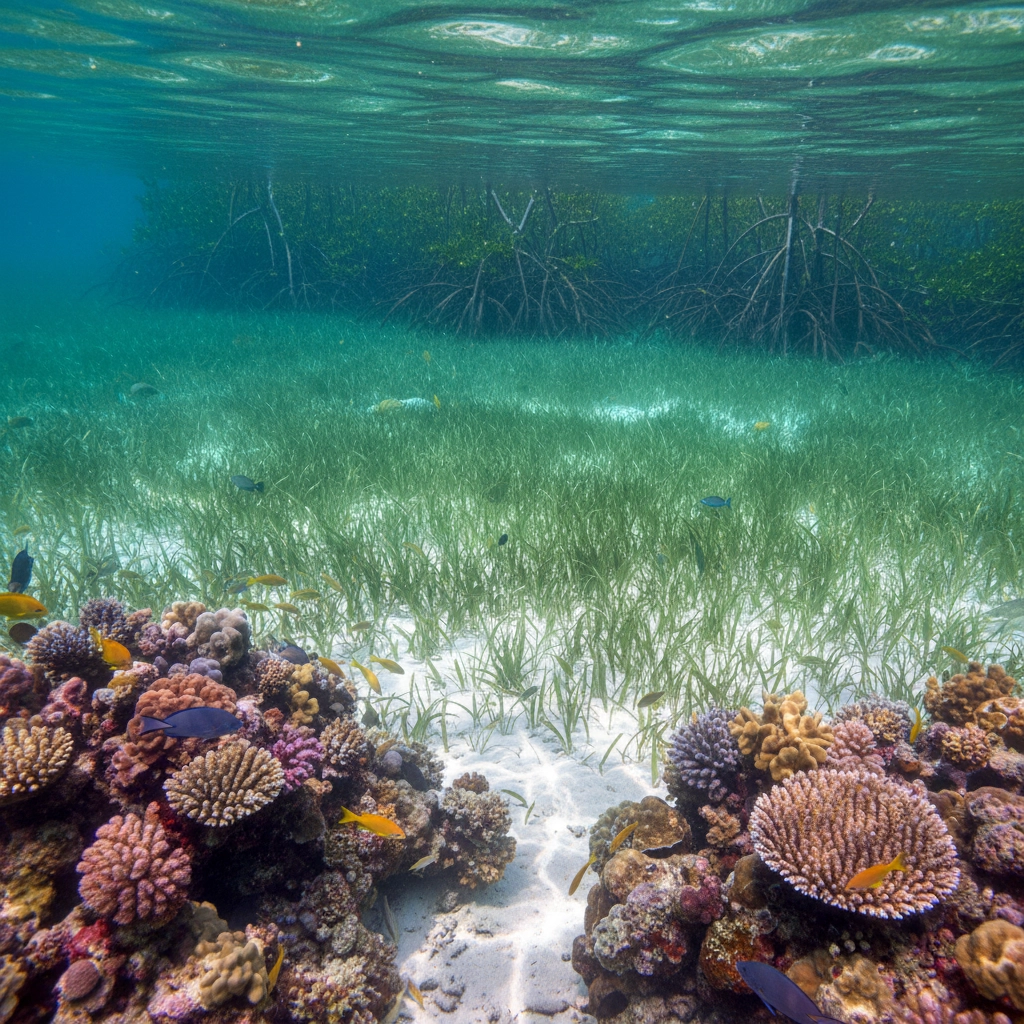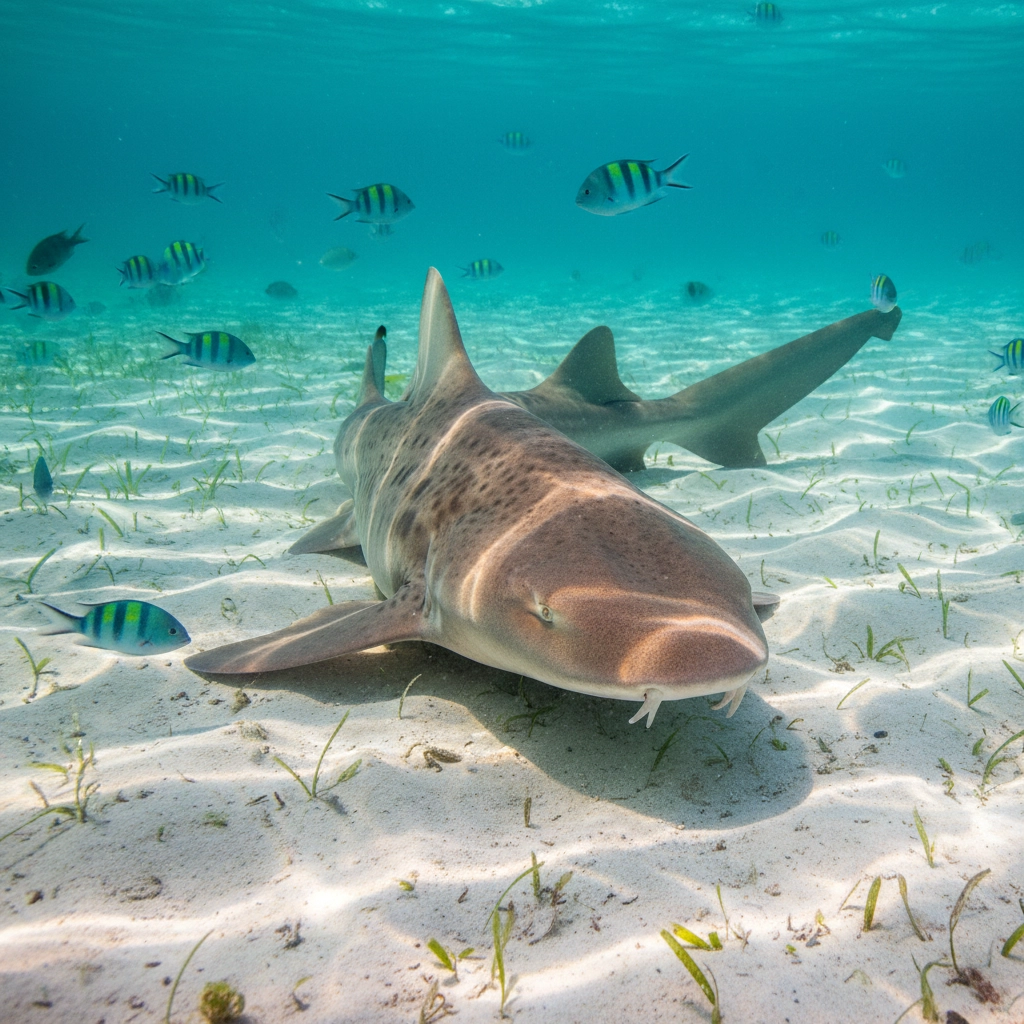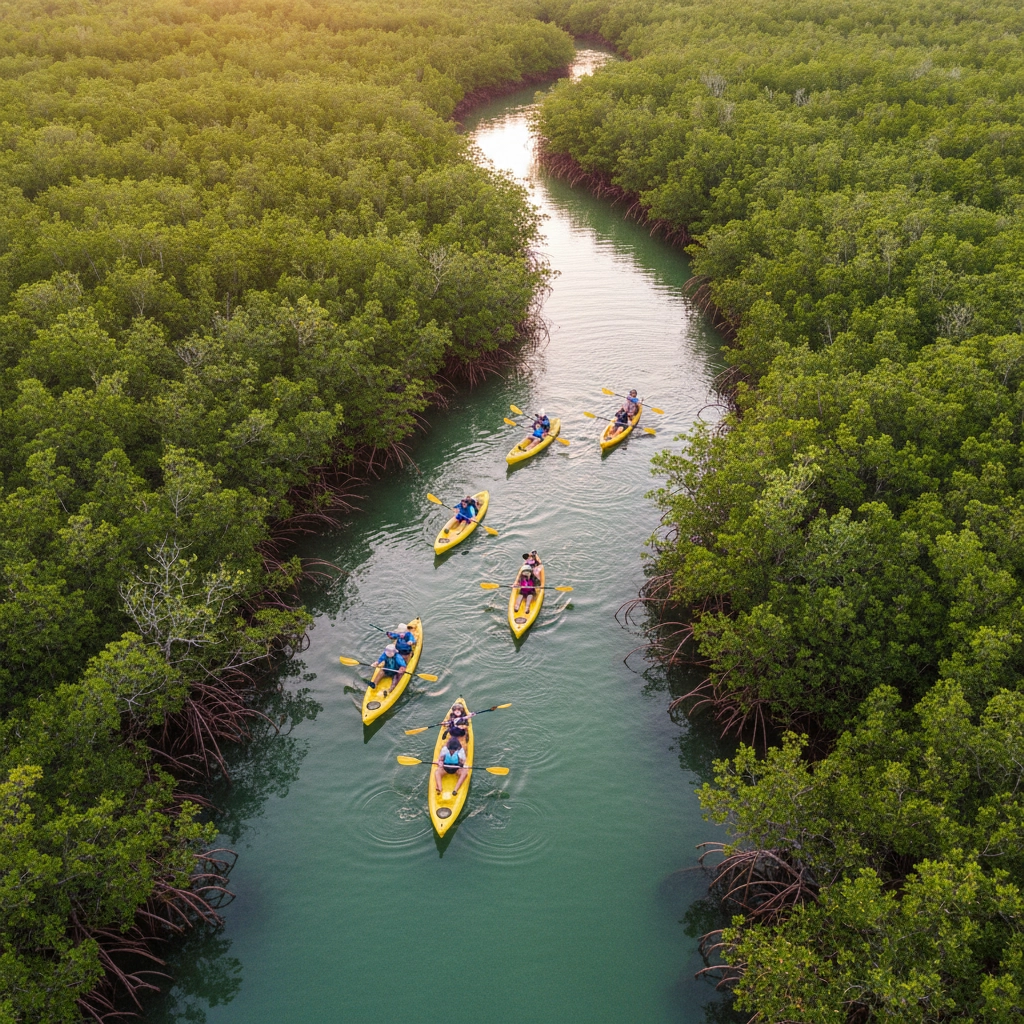Wildlife Encounters in the Keys: Sharks, Sea Turtles, and Student Discoveries
- Caleb Mullenix
- Oct 27, 2025
- 5 min read
The Florida Keys represent one of North America's most accessible marine laboratories, offering students unparalleled opportunities to observe and study wildlife interactions in interconnected tropical habitats. For educators seeking to transform classroom marine science concepts into hands-on discoveries, the Keys provide a living classroom where coral reefs, seagrass beds, and mangrove ecosystems support an extraordinary diversity of marine life.
Understanding the Keys' Interconnected Ecosystem
The Florida Keys' unique geography creates a natural laboratory where students can observe firsthand how different marine habitats support and depend upon each other. The shallow waters surrounding the island chain contain three critical ecosystems that work together: coral reefs on the ocean side, vast seagrass meadows in Florida Bay, and extensive mangrove forests along the shorelines.
This interconnected system supports wildlife populations that students can observe moving between habitats throughout their life cycles. Sea turtles, for instance, may nest on beaches, feed in seagrass beds, and seek shelter around coral formations. Sharks patrol the boundaries between these ecosystems, while countless fish species depend on mangroves as nurseries before moving to reef or seagrass habitats as adults.
Students participating in Florida Keys expeditions gain immediate understanding of ecosystem connectivity: a concept often difficult to grasp through textbooks alone. Begin planning your educational journey by emphasizing to students how each habitat observation contributes to understanding the larger marine ecosystem.

Shark Encounters: Dispelling Myths Through Direct Observation
Contrary to popular media portrayals, shark encounters in the Florida Keys provide exceptional educational opportunities rather than safety concerns. The region's shallow waters host several shark species that students can safely observe while learning about their ecological importance and conservation needs.
Nurse sharks, the most commonly encountered species in the Keys, spend daylight hours resting on sandy bottoms in shallow waters. These docile animals allow students to observe shark anatomy, behavior, and habitat preferences without the dramatic scenarios portrayed in films. Students can document their observations, noting how nurse sharks' flattened bodies and bottom-dwelling behavior reflect their feeding strategies and ecological niche.
Educational shark encounters occur frequently during snorkeling excursions in shallow seagrass beds and around patch reefs. Students learn to identify different species, understand their roles as apex predators, and recognize signs of healthy shark populations. These observations directly support lessons about marine food webs, predator-prey relationships, and conservation challenges facing shark populations globally.
Ensure that students understand proper wildlife viewing protocols before entering the water. Maintain respectful distances, never attempt to touch or feed sharks, and emphasize that these encounters represent privileges that require responsible behavior.
Sea Turtle Research and Conservation Opportunities
The Florida Keys serve as critical habitat for loggerhead and green sea turtles, offering students direct involvement in ongoing conservation research. The region's extensive seagrass beds provide essential feeding areas, while nearby beaches support nesting activities during summer months.
Students can participate in sea turtle monitoring programs, learning to identify individual turtles through photo-identification techniques. These activities teach scientific methodology while contributing to real conservation databases. Encourage students to maintain detailed observation logs, recording turtle size estimates, behavior patterns, and habitat associations.
The Sea Turtle Hospital on Marathon provides exceptional educational opportunities for students to understand conservation challenges and success stories. Students observe turtles at various recovery stages, learn about threats including boat strikes and plastic pollution, and witness rehabilitation techniques. These experiences transform abstract conservation concepts into tangible understanding of human impacts on marine ecosystems.
Incorporate sea turtle ecology lessons before, during, and after field observations. Students should understand life cycle stages, migration patterns, and the decades-long timeline required for sea turtle population recovery. This knowledge framework enhances field observations and reinforces the importance of sustained conservation efforts.

Mangrove Ecosystem Exploration Through Kayaking
Kayaking through mangrove channels provides students with intimate access to one of the world's most productive ecosystems. These guided explorations allow detailed observation of mangrove adaptations, wildlife diversity, and ecosystem services that students cannot experience from traditional boats or shore-based activities.
Students paddle through narrow channels, observing red mangrove prop roots that filter water, provide habitat structure, and prevent coastal erosion. They learn to identify different mangrove species while documenting wildlife sightings including juvenile fish species, wading birds, and invertebrates that depend on mangrove nursery habitat.
Encourage students to maintain detailed field journals during kayak expeditions, recording water clarity, wildlife observations, and human impact evidence. These records support post-trip analysis and help students understand connections between water quality, habitat health, and wildlife abundance.
Mangrove kayaking experiences also provide opportunities to study sponge communities in shallow bay habitats. Students can observe how sponges filter water, provide habitat complexity, and support diverse invertebrate communities. These observations reinforce lessons about filter feeding, water quality, and the importance of healthy substrate for marine communities.
Hands-On Research Opportunities
The Florida Keys offer numerous opportunities for students to conduct authentic scientific research while contributing to ongoing conservation efforts. Students can participate in water quality monitoring, wildlife population surveys, and habitat assessment projects that provide data for regional management agencies.
Coral reef monitoring represents one of the most engaging research opportunities available to student groups. Under supervision, students can conduct coral health assessments, document species diversity, and record evidence of bleaching or disease. These activities teach scientific methodology while contributing to databases tracking coral reef condition over time.
Seagrass bed monitoring provides another authentic research opportunity suited to student capabilities. Students learn to identify seagrass species, measure coverage density, and document associated wildlife communities. These assessments contribute to understanding seagrass ecosystem health and support regional restoration efforts.
Begin research activities by teaching students proper data collection techniques, emphasizing accuracy, consistency, and detailed documentation. Provide clear protocols and data sheets that ensure student observations meet scientific standards while remaining accessible to student skill levels.

Service Learning and Community Engagement
Educational expeditions to the Florida Keys should incorporate service learning opportunities that connect students with local conservation efforts and community needs. These experiences provide meaningful context for wildlife observations while teaching students about the human communities that share these ecosystems.
The Florida Keys Wild Bird Center on Key Largo offers volunteer opportunities where students can assist with wildlife rehabilitation activities. Students help prepare food for recovering birds, maintain enclosures, and assist with educational programs for visitors. These service activities teach students about wildlife medicine, habitat requirements, and the impacts of human activities on bird populations.
Community engagement opportunities include mentoring programs with children of migrant workers in the agricultural communities of the upper Keys. Students can share their marine science knowledge while learning about different cultural perspectives on environmental conservation. These cross-cultural exchanges enrich the educational experience while building empathy and global awareness.
Encourage students to document their service learning experiences through reflection journals, emphasizing how community engagement enhances their understanding of conservation challenges and solutions.
Planning Your Florida Keys Educational Expedition
Successful wildlife encounters in the Florida Keys require careful planning that considers seasonal patterns, weather conditions, and student learning objectives. Sea turtle nesting season runs from May through October, providing optimal observation opportunities during these months. Winter months offer excellent conditions for kayaking and coral reef exploration, with calmer seas and clearer water visibility.
Create detailed itineraries that balance structured learning activities with opportunities for independent observation and discovery. Include pre-trip preparation sessions where students learn species identification skills, research techniques, and safety protocols. These preparations maximize learning opportunities during field experiences.
Ensure that all wildlife encounters emphasize respectful observation practices and conservation ethics. Students should understand that they are temporary visitors in these ecosystems and that their behavior directly impacts wildlife and habitat health.
Consider incorporating technology tools including underwater cameras, GPS devices, and mobile applications for species identification and data recording. These tools enhance student engagement while teaching modern research techniques used by professional marine biologists.
Your Florida Keys expedition will provide students with transformative learning experiences that connect classroom concepts to real-world conservation challenges. Through direct wildlife encounters, hands-on research opportunities, and meaningful service learning, students develop deep understanding of marine ecosystems while building lifelong commitments to environmental stewardship.
For comprehensive planning support and detailed information about Florida Keys educational opportunities, visit Appleseed Expeditions to begin designing your unforgettable student expedition.



Comments